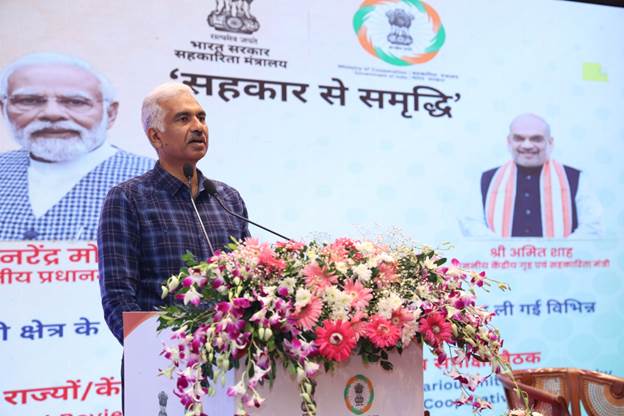Two-day National Review Meeting organized by the Ministry of Cooperation successfully concluded in Bhubaneswar, Odisha today, focusing on empowering cooperatives and enhancing their role in rural areas. The event was inaugurated by Manoj Ahuja, Chief Secretary, Odisha with Dr. Ashish Kumar Bhutani, Secretary of Union Ministry of Cooperation as a distinguished guest.
A central agenda of the meeting was the effective implementation of Standard Operating Procedures (SOPs) related to three major initiatives recently launched by Union Home & Cooperation Minister Amit Shah. These initiatives aim to promote the establishment and strengthening of 2 lakh new MPACS as well as cooperatives in dairy and fishery sectors. Discussions included the ambitious goals of “White Revolution 2.0” and enhancing cooperation among cooperatives, ensuring that these measures are enacted at the grassroots level promptly.
Among the ten initiatives rolled out by the Ministry of Cooperation in its first 100 days, three initiatives were launched by Amit Shah recently at New Delhi during a National Conference and are are pivotal for rural economic growth.
The meeting aimed to deliberate on the successful implementation of the ministry’s 100-day action plan. The meeting also underscored the importance of engaging youth in cooperative start-ups, modernizing cooperative education and training to foster greater participation.
Ahuja emphasized the necessity of building robust cooperative institutions at the grassroots level to meet local needs for quality inputs, storage, processing, credit, and marketing. He cited the example of Amul-like Multi-State Cooperative Societies, noting how various initiatives—such as Model Byelaws and the establishment of Jan Aushadhi Kendras—have transformed cooperatives into One Stop Shop catering to all the needs of farmers under one roof.
Dr. Bhutani underscored the significance of cooperative societies in boosting the nation’s GDP. He pointed to the adoption of Model Byelaws as crucial for enabling PACS to diversify into 25 new business avenues, thus enhancing their economic viability. The establishment of new cooperative societies like NCEL, NCOL, and BBSSL aims to ensure that farmers receive fair prices for their produce, including organic goods in both domestic and international markets.
A key highlight was the ministry’s commitment to digitization through the NCD Database, aimed at real-time data collection and efficient monitoring of initiatives nationwide. Dr. Bhutani also announced plans for regular capacity-building training, aiming to educate 50% of cooperative members over the next five years.
He called on cooperative departments across states and Union Territories to engage in the upcoming International Cooperative Alliance event scheduled for November 2024, further reinforcing the cooperative movement’s potential in India.
Spread across various sessions including, digitalization, PACS as one stop shop, Cooperation among Cooperatives and Cooperative training and social media outreach, the sessions were attended by seniors officers from the Union Ministry of Cooperation, state governments including Uttar Pradesh, Bihar, Jharkhand, Punjab, Andhra Pradesh, Arunachal Pradesh etc., NABARD, NDDB, GCMMF, NFDB etc.



